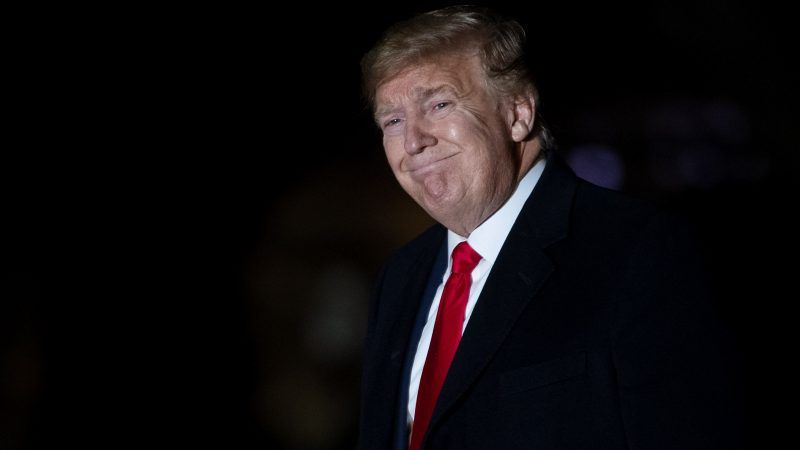Did Trump Just Admit To Withholding Material From the Impeachment Process?
As Rep. Justin Amash notes, the second article of impeachment charges the president with obstructing Congress by refusing to provide documents and testimony.

One of the notable characteristics of President Donald Trump's impeachment trial is that there is little dispute about the underlying charges.
The first of two articles of impeachment, for instance, charges President Trump with seeking to "pressure the Government of Ukraine" to help him gain a personal political advantage over a likely political rival, former Vice President Joe Biden. "Trump engaged in this scheme or course of conduct for corrupt purposes in pursuit of personal political benefit."
We know this for a variety of reasons: because of the transcript of a key phone call that Trump had with Ukranian President Zelenskyy; because of recently released government documents showing that government officials were concerned about the legality of delaying the aid funds; because of a Government Accountability Office report laying out a detailed timeline of the delay and finding that it was illegal—and, of course, because both Trump's personal lawyer, Rudy Giuliani, and Trump's acting chief of staff, Mick Mulvaney, have said as much. "I have news for everybody," Mulvaney said last year, when discussing the legality of withholding the funds. "Get over it. There is going to be political influence in foreign policy."
Also, because Trump himself asked China and Ukraine to investigate Biden while standing in front of news cameras on the White House lawn.
That covers the first article of impeachment. This week, Trump all but admitted to the second, which charges that he obstructed Congress by withholding documents and testimony during the House impeachment proceedings.
The second article says Trump undermined the Constitution by seeking "to arrogate to himself the right to determine the propriety, scope, and nature of an impeachment inquiry into his own conduct, as well as the unilateral prerogative to deny any and all information to the House of Representatives in the exercise of its 'sole Power of Impeachment.'"
Yesterday, when asked about the Senate impeachment trial, Trump appeared to admit to doing exactly that.
As Justin Amash, an independent congressman from Michigan who recently defected from the Republican party after saying that Trump had committed impeachable offenses, noted on Twitter, Trump appeared to be bragging about obstructing Congress:
"We're doing very well. I got to watch enough. I thought our team did a very good job. But, honestly, we have all the material; they don't have the material."
President Trump brags about obstructing Congress, which is the second article of impeachment.pic.twitter.com/EpfK4GlTVv
— Justin Amash (@justinamash) January 23, 2020
The White House has since denied that this was a reference to withholding documents, saying he only meant that the evidence was on his side. But it is hard to believe that shortly after an extended Senate argument about whether the impeachment trial rules would allow new evidence and testimony, Trump was merely speaking generally about his defense.
Trump has been charged with withholding relevant information in a way that undermines Congress' power to investigate him for the purposes of impeachment; his statement yesterday looks very much like an admission that he withheld relevant information in a way that undermines Congress' power to investigate him for the purposes of impeachment.
That may or may not be cause for removal. Probably the best defense of Trump, or at least the most honest one, is that the charges are essentially accurate, but do not warrant being forced out of office. Politics and personal gain inevitably seep into presidential decision making, this argument goes, and even bad presidential decisions do not necessarily justify removal. Or, as Mulvaney put it: Get over it.
Still, it is telling that Trump and his allies have all but admitted to the basic charges against him, and that the best defense of Trump involves admitting his guilt.



Show Comments (210)